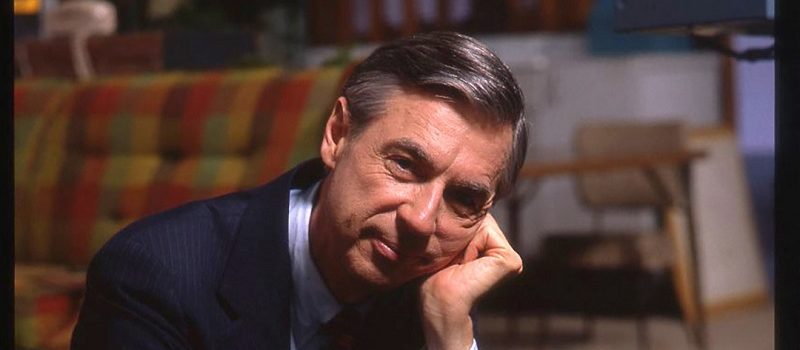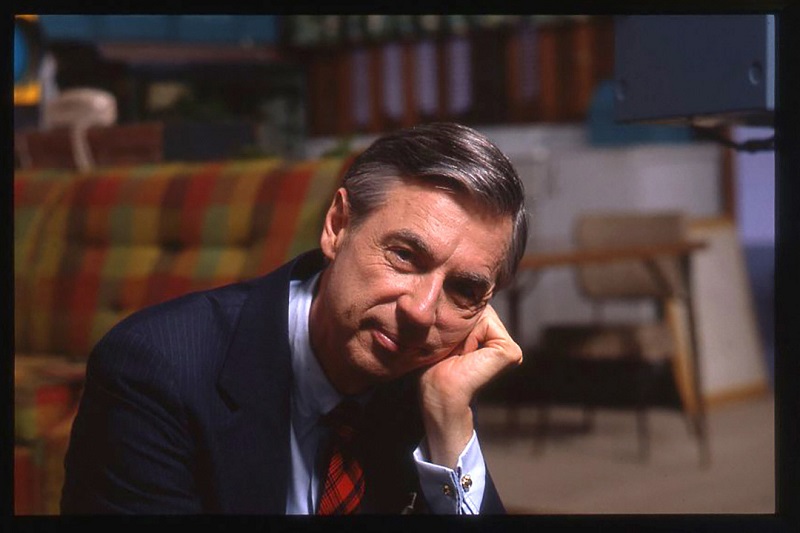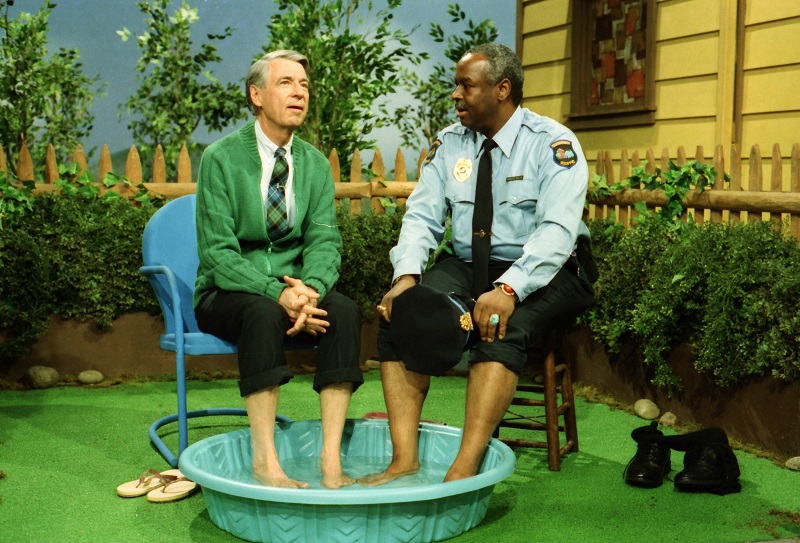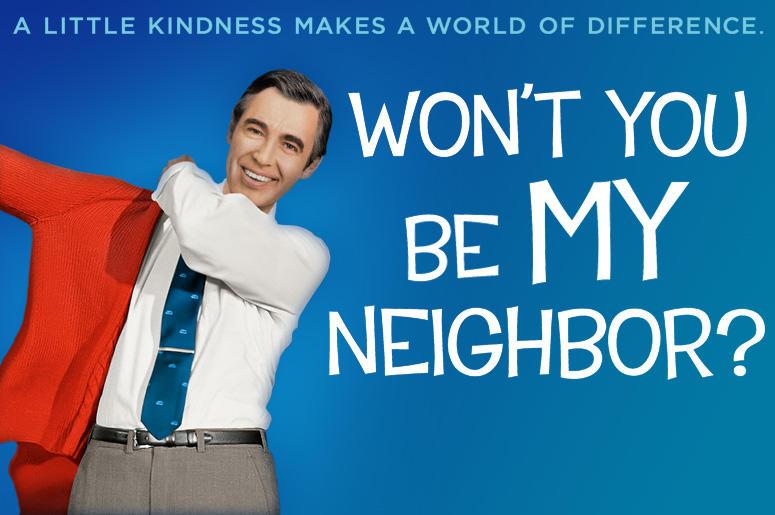Won’t You Be My Neighbor is the documentary that has quickly become one of summer’s most talked about flicks. That’s astonishing. Think about that, the doc that looks at the career of Dr. Fred Rogers is dominating cinematic conversation across the country in a season that features blockbusters such as Avengers: Infinity War, The Incredibles 2, Jurassic World: Fallen Kingdom and Deadpool. Why?
To answer that question, one must go back to the beginning and as such, we have found seven reasons why Won’t You Be My Neighbor is the summer’s most important movie. It’s a little early to be tossing around year-long monikers, but it will easily be in the discussions for one of the best movies of the year—narrative, documentary… doesn’t matter. This thing is utter bliss on so many levels. Also, a warning… when watching it—bring your tissues.
1. The film reminds us why love, or the absence of it, is at the root of all things.
If there was a congruent truth through the decades of programming that Rogers provided our nation’s youth, it was love. He even states during one scene in the documentary that “Love is at the root of everything—all learning, all parenting, all relationships. Love or the lack of it.” Pretty hard to disagree with that sentiment. It’s profoundly true. Many souls that fail to meet their full potential at the least or become a detriment to society at the most can trace their life trajectory to a lack of love in their life growing up. Many that triumph share a common trait that love was ever-present in their lives (regardless of where it came from) and as such, developed a level of confidence, freedom and self-awareness that is integral to societal success.
This idea can also be applied to the world and its geopolitical conflicts as well. When The Beatles famously sang, “All You Need is Love,” they were speaking to the battles being waged in the African continent, the war in Vietnam and the Cold War as a whole. See, love can be a priceless asset on a personal and individual level and can also be utilized to explain war and international conflict that takes the lives of countless souls.
It is a lofty ideal, sure, but one that gives us faith that the root of what ails our planet and us as peoples is something honestly truly simple. Love is not a complicated concept or virtue. But, history has informed us that the absence of it adds up to an intricate web of failure—often times with catastrophic results.
2. Mr. Rogers’ Neighborhood was radical
Childhood psychology was evolving at the time that Rogers first took the air in Pittsburgh. Identifying the fact that kids had emotions as powerful and fully developed—and equally joyous and painful and everything in between—was seen as radical. Through his show, that sentiment was delivered week-in and week-out, thus changing how parents viewed the development of their kin. How did that approach work for him? Well, children adored him, and he quickly became a national star. When his show moved to the newly founded PBS, that only elevated his status among kids and their parents. With every single appearance across the land, he was mobbed by children wanting to simply be in his presence. Rogers seemed to get them on a myriad of levels, more than any other national figure that had come before. That could easily explain that cross generational appeal of the documentary that has taken the nation by storm. He touched us all, from those born in the sixties through the eighties and beyond. That’s a whole lot of people who were radically altered by the existence of what seems on the outside as a simple show, but in fact was much deeper, profound and significant than any children’s television program in history.
His show was also revolutionary as it tackled topics that were believed to go over children’s heads. Within a single week of being on the air, Robert Kennedy was assassinated. Knowing that this was the topic that would dominate the nation’s attention, and thus discussions at home, Rogers felt it imperative to take his newfound platform and use it to address the awful news to the youngest souls in the land. He even tackled divorce in subsequent episodes, bringing sensical answers to questions children had about subjects that were mostly likely not being explored at home, but whose reality was all-too-real for them.
3. Racial divide goes for a dip
In those early days of Mr. Rogers’ Neighborhood, segregation was still rearing its ugly head. There were laws meant to stop such societal evils, but the facts on the ground of the nation were that little had changed in terms of racial attitudes of whites towards blacks. When Rogers took a foot bath and shared water with Francois Clemmons’ operatic police officer on the show, it was seismic. Clemmons was the descendant of slaves in the south and it may have been seen as the subtlest of efforts—sharing a foot pool with Rogers—when in fact it was about as pointed as a message could be. White feet, black feet, equal… and both enjoying cooling off on a sizzling summer day. Isn’t that what it’s all about?
4. The power of puppets
Rogers always stated that he didn’t need to put on a funny hat or act stupid or silly to reach his audience. He was just himself—that and those cheaply made, but utterly endearing puppets. As anyone who has had a child knows, there is something about putting a puppet on your hand and taking your voice to another place that completely transfixes kids. You can reach them on another level and inversely, get them to open up as they can’t or won’t to adults who pose the same inquiries as the puppets. Daniel the Tiger was the beginning, but everyone else who came along in Mr. Rogers’ Neighborhood created a connection with the viewers that exponentially grew over the decades.
5. The power of docs
Simply put, documentaries have an uncanny ability to reach the masses and enlighten, entertain and educate in a way that no other medium can achieve. That has never more been the case than with director Morgan Neville’s triumphant work (that better not only score a Best Documentary nomination at this year’s Oscars—but win). The manner Neville lays out his narrative, introduces his story’s players, peppers it with tone, color and message is nothing short of a lesson for all filmmakers to inhale to its fullest. We are living in a golden age of documentaries right now, between RBG, Three Identical Strangers, Whitney, McQueen and Won’t You Be My Neighbor, history will look back at this period as something truly monumental.
6. Children TV can be entertaining, educational and not pedantic
One of the things that drove Rogers back to television when he left it to pursue the ministry was what he witnessed on the small screen when it came to programs geared towards the youngest viewers. It was all slapstick, stupidity-laden bits meant to entertain, but at the lowest common dominator. Television was still a fresh invention and as such, had endless potential to do something that had never been achieved prior. There were millions of moldable minds out there that were being wasted away by nonsense and nincompoops heralding in cartoons and live action programs equally that failed our future in every sense. Rogers turned the entire thing on its head as he reached his audience on a level that simultaneously enabled them to control their growth, awareness and world view in manner that would befit our society in the most priceless of ways.
7. Rogers brought together all walks of life. The film recalls something from our youth that unified us then…and is doing it again now.
Won’t You Be My Neighbor arrives at a time when our nation could not be more divided and our leaders more divisive. The film reminds us that when all is said and done, we are all equal. We are all important. We all have feelings and most importantly, we all seek love and are entrusted with the priceless ability of giving love. Anything short of that emotion is a waste of this gift of life that has been afforded to all of us. Throughout the film, Rogers brings that point home repeatedly through his words, his actions, his program and most effectively—that scene where he is testifying before congress seeking to keep $20 million in funding for public broadcasting.
He states, “I give an expression of care every day to each child, to help him realize that he is unique. I end the program by saying, ‘You’ve made this day a special day, by just your being you. There’s no person in the whole world like you, and I like you, just the way you are.’ That sentimentality is much needed today and above all else, that feeling permeates the film and explains why Won’t You Be My Neighbor is the most important movie of the summer—heck, the year.




